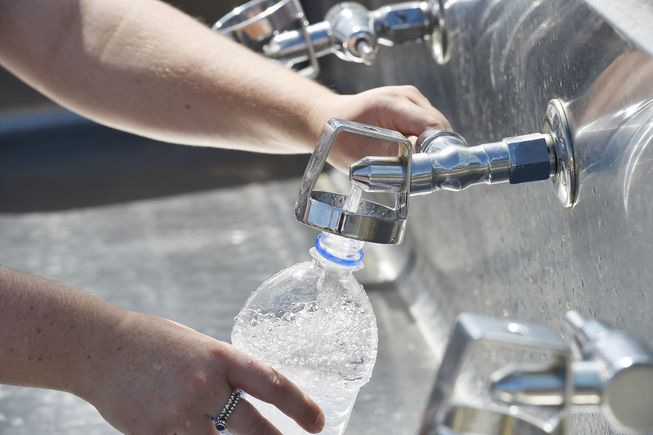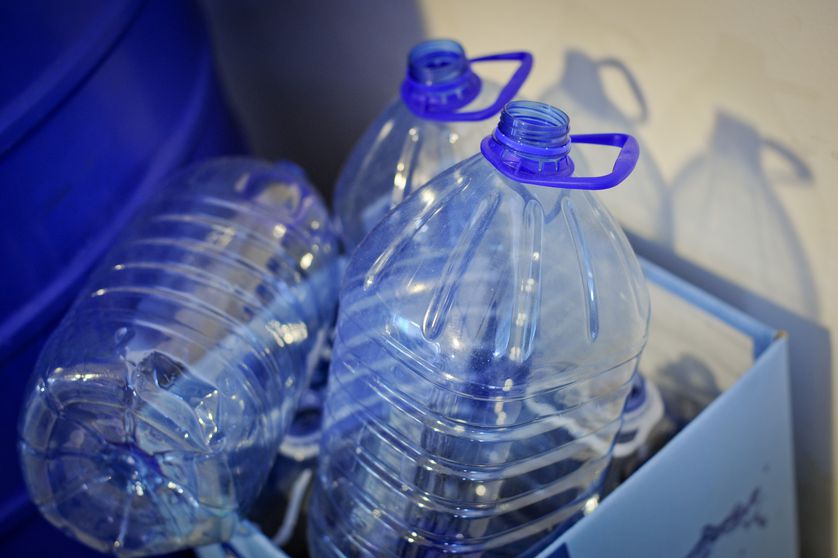你应该把那个塑料水瓶再灌满吗?
你应该把那个塑料水瓶再灌满吗?
At some point, you've probably looked at that empty water bottle in the backseat of the car and wondered if it's got just a little more life in it.
在某个时刻,你可能会看着汽车后座上的空水瓶,想知道它是否还有一点生命。
After all, if you're going to use plastic, why not make it at least double-use plastic — rather than add to the mountain of one-hit wonders.
毕竟,如果你打算使用塑料,为什么不至少重复使用塑料呢?

Congratulations for drinking plain-old tap water. But about that plastic ... (Photo: xshot/Shutterstock)
The most well-intentioned among us might even try to turn it into triple- or quadruple-use plastic.
我们当中最善意的人甚至可能试图把它变成三次或四次使用的塑料。
But there's a price on those good intentions, especially when it comes to your health.
但这些良好的意愿是要付出代价的,尤其是涉及到你的健康时。
The thing is, most single-use water bottles are made from polycarbonate plastics, a pliable and transparent material that would seem ideal for water vessels. And most of those bottles are produced using a chemical compound called polyethylene terephthalate, or PET.
问题是,大多数一次性水瓶是由聚碳酸酯塑料制成的,这是一种柔韧透明的材料,似乎很适合用来盛水。这些瓶子大多是用一种叫聚对苯二甲酸乙二醇酯(PET)的化合物生产的。
Bottles made with PET have long been considered a safe alternative to the much more studied — and vilified — alternative, Bisphenol-A, or simply BPA.
用PET制造的瓶子长期以来一直被认为是一种安全的替代品,而不是被研究得更深入的替代品——双酚a或简单的BPA。
In fact, manufacturers proudly tout their bottles to be BPA-free. And that's for good reason. Several studies have linked BPA to health woes ranging from cancer to heart disease to even behavioral issues. BPA was found to mimic hormones that can create havoc in the human body.
事实上,制造商们很自豪地宣传他们的产品是不含BPA的。这是有原因的。一些研究已经将BPA与健康问题联系起来,从癌症到心脏病,甚至是行为问题。双酚a被发现可以模拟荷尔蒙,对人体造成破坏。
But more recent research suggests BPA-free alternatives may not be such saints after all — and in fact may pose similar health threats.
但最近的研究表明,不含BPA的替代品可能并不是最好的选择——事实上可能会造成类似的健康威胁。
The trouble is chemical compounds don't stay baked into plastic. They're known to leach into the water itself. A study from the Harvard School of Public Health found that people who drank for a week from polycarbonate bottles had a two-thirds increase of BPA their urine.
问题是,化合物不会一直留在塑料里。它们会渗入水中。哈佛大学公共卫生学院的一项研究发现,饮用聚碳酸酯瓶一周的人,其尿液中的BPA含量增加了三分之二。
And those were the results from one-time usage of plastic bottles. What happens when you flush them repeatedly with refills of water? It's easy to imagine more of those chemicals leaching into the water over time.
这些是一次性使用塑料瓶的结果。当你反复用水冲它们的时候会发生什么?很容易想象,随着时间的推移,更多的化学物质会渗入水中。
Then there's the problem of microplastics.
还有微塑料的问题。
Last year, scientists from the State University of New York tested 259 containers of bottled water and found tiny pieces of plastic in 93 percent of them. Scientific opinion on whether ingesting plastic, however, remains divided. Some experts suggest the human body is perfectly capable of flushing out contaminants like microplastics.
去年,纽约州立大学的科学家们测试了259个瓶装水容器,发现其中93%都有微小的塑料碎片。然而,关于是否摄入塑料的科学观点仍然存在分歧。一些专家认为,人体完全有能力将微塑料等污染物排出体外。
Even the World Health Organization categorizes the risk from drinking microplastics as "low" — although it hastens to add that more research is needed.
即使是世界卫生组织也将饮用微塑料制品的风险归为“低”类——尽管它还需要更多的研究。
The older the bottle, the bigger the problem
瓶子越旧,问题就越大

It's tempting make plastic water bottles more than a single-use item. (Photo: Alina Avula/Shutterstock)
One thing that we know for certain is that, regardless of the type of plastic, a water bottle collects a lot of dings, dents and creases as it's reused. And those nicks could increase the chances of chemicals leaching into the water.
有一件事我们可以肯定的是,不管塑料是什么类型的,水瓶在重复使用的过程中会收集很多的凹痕和折痕。这些裂缝会增加化学物质渗入水中的机会。
Experts warn that "everyday wear and tear from repeated washings and reuse can lead to physical breakdown of the plastic, such as visible thinning or cracks."
专家警告说,“每天重复的清洗和重复使用会导致塑料的物理损坏,比如明显的变薄或裂缝。”
Then there's the problem of bacteria — something that also happens to thrive in cracks or dents, thanks to the difficulty of washing those nooks.
还有细菌的问题——由于很难清洗那些角落,细菌也会在裂缝或凹痕中大量繁殖。
While all bacteria isn't necessarily bad, it's probably safe to say you don't want to ingest it on the regular.
虽然并不是所有的细菌都是有害的,但可以肯定地说,你并不想经常摄入细菌。
The bottom line? If you really want to be a hero to both the environment and your body, reusing a plastic water bottle probably isn't a good idea. Instead, get out that stainless reusable water bottle that's been in the cabinet and fill it up.
底线?如果你真的想成为环境和身体的英雄,重复使用塑料水瓶可能不是一个好主意。相反,可以把橱柜里的那个可重复使用的不锈钢水瓶拿出来装满水。
The best thing you can do is skip bottled water entirely, especially as research continues to pile up on the potential hazards of drinking water from any kind of plastic.
你能做的最好的事情就是完全不喝瓶装水,尤其是在各种塑料制品对饮用水潜在危害的研究还在不断增加的情况下。
As Shanna Swan of the University of Rochester School of Medicine and Dentistry, told the Australian Broadcasting Corporation. "This is coming at a good time because the use of bottles for consuming water is getting very bad press now because of its carbon footprint.
正如罗切斯特大学医学和牙科学院的莎娜·斯旺告诉澳大利亚广播公司的那样。“这来得正是时候,因为瓶装水的使用由于其碳足迹而受到了非常负面的报道。
"It's just another nail in the coffin of bottled water, the way I see it."
“在我看来,这不过是瓶装水棺材上的又一颗钉子。”


















